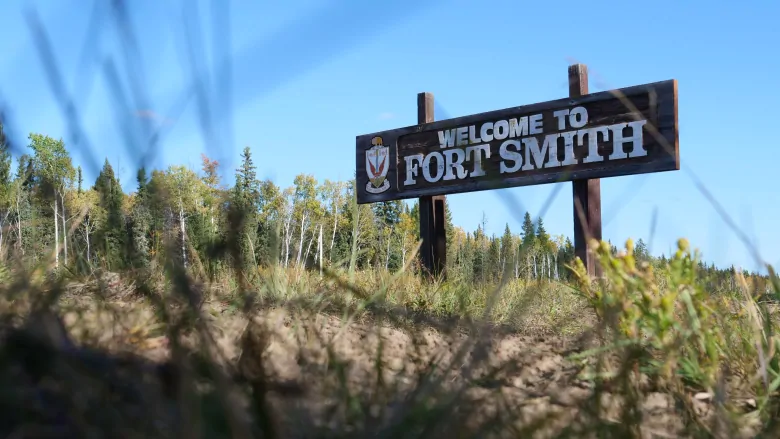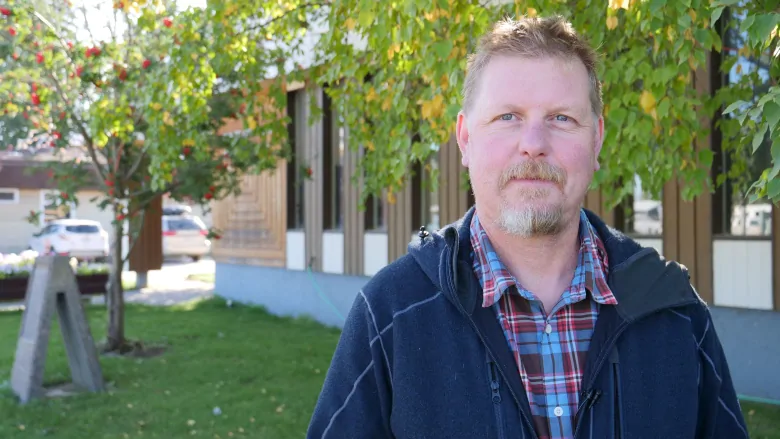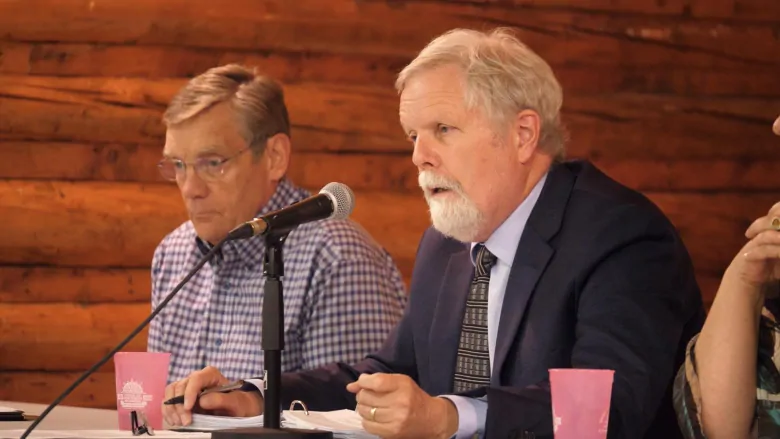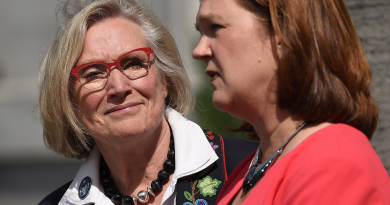Community in Arctic Canada concerned about the future of Aurora College at Northwest Territories election

In Fort Smith, northwestern Canada, the economy is stalling. The town’s population is projected to decline. In fact, the town is literally shrinking — its riverbank is washing away.
But more than any of these issues, one looms large over this fall’s territorial election — the uncertain future of Aurora College, the territory’s post-secondary institution.
Last year, in a comprehensive review of the college, the territorial government recommended the headquarters and “main campus” of a renewed polytechnic university be built not in Fort Smith, but in Yellowknife.
That recommendation became a rallying cry for residents of Fort Smith to resist a perceived tide of services and investment away from their community toward the territorial capital.
“There is a deep sense of betrayal by this government, that they’ve turned on this community,” said Michael Miltenberger, a former MLA for Thebacha ousted in 2015.
“Things slip away, and they’re gone before we know it,” said Denise Yuhas, one of the candidates standing for MLA in the fall election.
“There’s a lot on the line here, for all of us.”

Local concerns fall on ‘deaf ears’
At the root of the community’s anger with the territorial government is the Aurora College Foundational Review, initiated in 2017 and tabled earlier this year.
Though conceived as part of a plan to address serious shortcomings in governance and programming at the college, the result was an ambitious vision for the transformation of the college into a polytechnic university with a “brick-and-mortar” main campus in Yellowknife.
In recommending the university centralize its operations in the capital, the report repeatedly demonstrated a tone-deafness about the importance of the college to Fort Smith.
It said the recommendation “may appear obvious” due to the poor “social experience” available for “modern day students and millennials” in Fort Smith, which it called the “main reason” for declining enrolment.
It noted the town, home to fewer than 3,000 people, had a lack of late-night entertainment options, leading to “potentially aggressive behavior and violence,” caused, it said, by students drinking on campus.
At the time, Education Minister Caroline Cochrane, the MLA for Range Lake in Yellowknife, told CBC she was “ecstatic” with the report.
In Fort Smith, local leaders say the government’s treatment of the review was emblematic of the 18th Assembly’s relationship with communities.
“We feel like we’re fighting with a different department every month,” said Kevin Smith, the town’s deputy mayor. “It feels like it’s been very adversarial, and we’re not getting a lot of support.”
Smith said the town has struggled to get meaningful responses on local issues, from ambulance services on the local highway to reinforcements for the riverbank’s “slide zones.”
“It seems like a lot of our concerns fall on deaf ears.”

Jobs, services trickle towards Yellowknife
Worse, the college is not the only major employer the 18th Assembly has considered relocating away from the community.
In 2016, the departments of Public Works and Transportation were amalgamated, and headquarters for the former moved from Fort Smith to Hay River.
In exchange, the territory headquartered the newly-devolved Department of Lands in Fort Smith. But there were no new jobs created, according to Fort Smith Councillor Jessica Cox — federal employees already working in town just became territorial employees.
Health services have been affected too. Dialysis services, brought to the community under the 17th Assembly, were moved away under the 18th.
“We can’t recruit our own doctors anymore,” said Smith, the deputy mayor, noting doctor shortages have forced the closure of the health centre several times.
Local administrative boards have been eliminated, meanwhile, and senior managers, like the regional superintendent for the Department of Industry, Tourism, and Investment, no longer live in town.
“There seems to be a movement to centralize things in Yellowknife,” said Julie Lys, on-the-land co-ordinator for the N.W.T. Métis Nation, based in Fort Smith. “Every job that’s lost in our community is a family gone from our community.”
For the past four years, Fort Smith has had a voice at the highest levels of government. Louis Sebert, the incumbent, served as a cabinet minister for the entirety of the 18th Assembly, despite attempts by MLAs to oust him over his handling of the justice portfolio.

Sebert says there’s the same number of government jobs as when he took office, though it’s not clear if he’s including jobs that transferred from the federal government.
However, he’s in lockstep with his rivals regarding the future of Aurora College.
“If the government truly is dedicated to decentralization, I see no reason why the college should be centralized in Yellowknife,” he said.
His rivals for Thebacha’s seat are, on the surface at least, less trusting.
“This process of centralization, this huge pull into Yellowknife, at times, is dysfunctional,” said candidate Don Jaque. “There is not political will to control the bureaucracy.”
And when that happens, “the people at the end of the line get poor service,” he said.
“I think we’ve had weak leadership,” said Frieda Martselos, also vying for the seat. “The ordinary MLAs should be more united.”

Centralization affects whole territory, leaders say
“This is happening all over the Northwest Territories,” said Yuhas, the fourth candidate on the ballot.
“When I talk about Fort Smith, I think, man, it must be awful if you’re someone from Tuk[toyaktuk] or Aklavik,” she said.
Nunakput couldn’t be further away from Fort Smith, geographically — the riding incorporates the territory’s four most northwestern communities, including Tuktoyaktuk.
But the sentiment could not be closer.
“Yellowknife is just a vacuum for our dollars,” said Eddie Dillon, chair of the Tuktoyaktuk Community Corporation. “They create jobs in Yellowknife.”
In the Inuvialuit Settlement Region, community corporations are gradually providing more direct services to residents, taking over functions from the territorial government.
“The [territorial government] really is the middle man for a lot of the programming, from the money that flows down from the feds,” said Vernon Amos, the chair of the community corporation in Sachs Harbour.
The territory funds “several of the highest-paying positions in the community,” he said, “but having an actual presence here, it’s not really.”
Local control was a promise of land claim and self-government agreements signed in the Nunakput region.
But in other parts of the territory, communities still rely on the territorial government as a local employer, making them vulnerable to centralization.
“Only the fact that we’re a regional government centre saves Fort Simpson,” said Sean Whelly, the mayor of Fort Simpson. “They’re not really looking at how they’re making communities healthy.”
“We’re administering a little welfare state here … Somehow, the system hasn’t worked that great for small communities.”
In Fort Smith, some feel as though they are living through the end of that system.
“As time goes by our territory is/will become a mirror of the Yukon,” wrote Fort Smith Councillor Mike Couvrette in an email, “a very centralized economy and government with a few outlying traditional communities.”
Related stories from around the North:
Canada: Candidates push for better safety net in Canada’s Northwest Territories, CBC News
Finland: Finland’s Centre Party elects new leader, Yle News
Russia: Career diplomat to represent Murmansk region in Russian senate, The Independent Barents Observer
Sweden: Ann Linde named Sweden’s foreign minister in cabinet shuffle, Radio Sweden
United States: Alaska governor accepts reduced dividends, upholds most vetoes, Alaska Public Media



